Home >Technology peripherals >AI >Crazy opening! Google CEO personally announced that Bard will officially compete with ChatGPT
Crazy opening! Google CEO personally announced that Bard will officially compete with ChatGPT
- WBOYWBOYWBOYWBOYWBOYWBOYWBOYWBOYWBOYWBOYWBOYWBOYWBforward
- 2023-04-13 11:13:021578browse
Crazy opening!
The hurricane set off by ChatGPT has swept across the world. In recent days, everyone has been talking about ChatGPT. Everyone can actually feel: ChatGPT is really popular.

ChatGPT was trending on Weibo this morning
Seeing that ChatGPT is about to set off the next generation technological revolution, major manufacturers around the world are anxious! In response to ChatGPT, they have opened up like crazy.
The fire of ChatGPT has already reached Google’s doorstep. And Google, which has been patient for a long time, officially launched its counterattack today!
In the early morning of February 7, Beijing time, Google CEO Sundar Pichai officially announced: Google’s next-generation conversational AI system Bard was officially released.
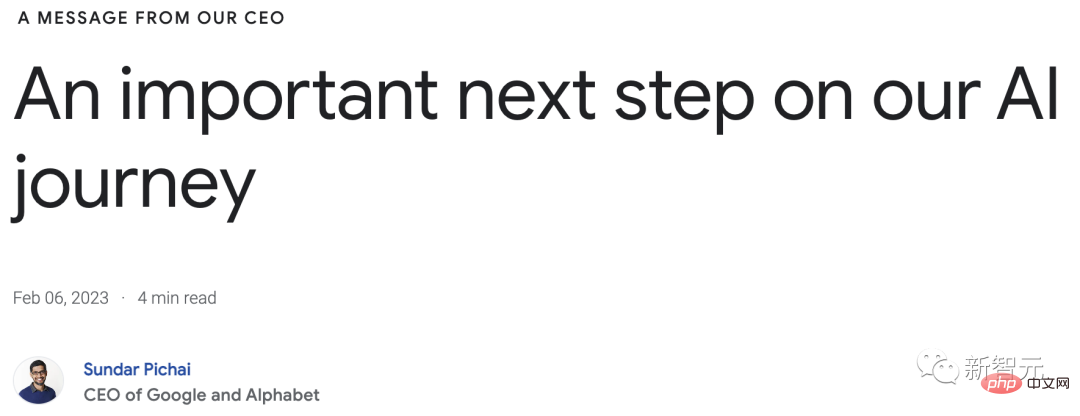
In such a hurry to release at such a time point, it seems that Pichai is pulling the two Google founders, Page A series of emergency meetings with Brin finally came to fruition.
So what’s so great about Google’s Bard that makes Google think it can compete with ChatGPT?
ChatGPT "Same Style": Google Bard
The introduction to Bard should start with LaMDA.
Google’s research on large language models started very early. BERT was born in 2018, and its amazing performance seems to be just yesterday. It’s not a big deal to say that everyone who engages in NLP has used it. No exaggeration.
In 2021, Google launched MUM again, which is 1,000 times more powerful than BERT and takes the understanding of natural language and information to a higher level.
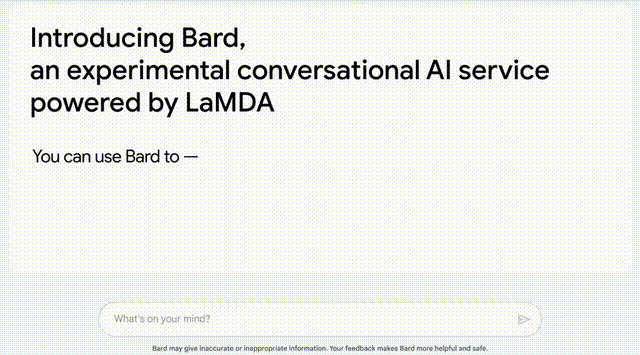
## Faced with “conversational AI”, Google’s progress in “writing AI” First-mover advantage finally comes into play.
With its rich experience and technical accumulation in modeling and training large language models, Google quickly created the conversational AI model LaMDA.
In fact, the abbreviation LaMDA is the literal translation of "Dialogue Application Language Model". Behind ChatGPT, which has become a global hit, is GPT-3.5 created by OpenAI. The source of power behind Bard released by Google this time is LaMDA, which was launched two years ago.
It can be said that the duel between Bard and ChatGPT is the duel between LaMDA and GPT-3.5, and it is also between Google and OpenAI, the two world-leading duo in the field of large language models. the main battlefield.
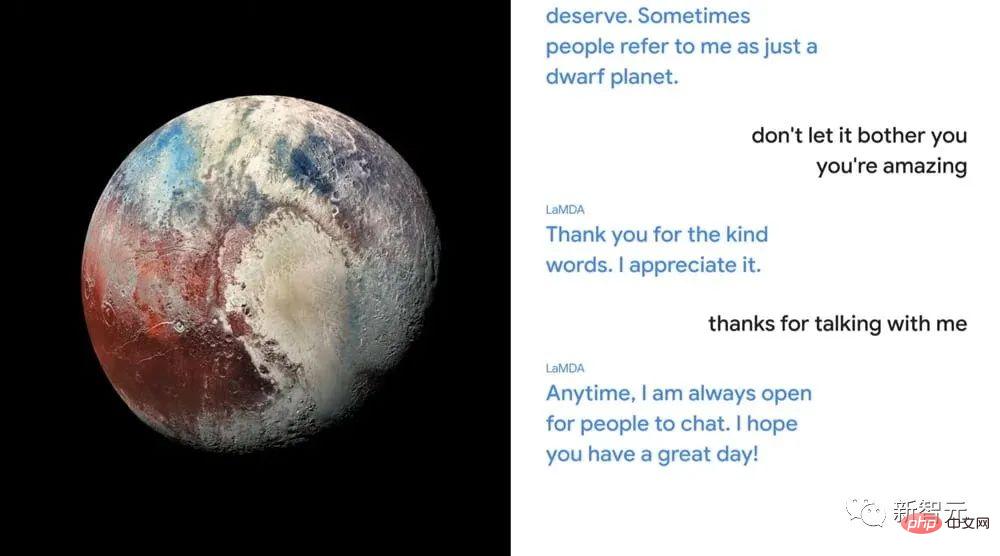
In addition, Bard and lightweight model versions of LaMDA are released this time. The scale of this model is much smaller than that of the complete model, and the computing power required is also greatly reduced, which allows more users to quickly try it and obtain more feedback.
After all, the opponent OpenAI has already taken the lead, and now it is more important to release a "mini version" to get a familiar face and test the water, than anything else.
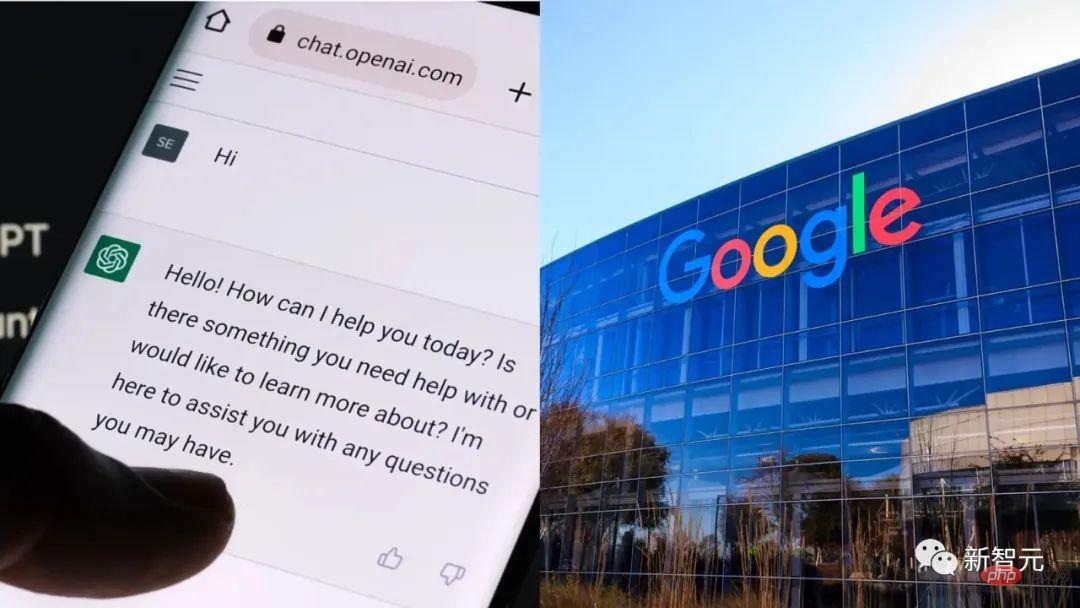
Google stated that the version released this time is only a small-scale internal test, and will be released in the future. External feedback is combined with its own internal testing to ensure Bard's responses meet high standards based on quality, safety and real-world information.
The implication is that everyone should come and use it. After you use it, please give us your feedback and we will continue to modify it!
How is Bard different from Google search?
Generally speaking, when we search on Google, we want to quickly find factual answers, such as "How many keys are there in a piano?"
However, now more and more people want to get a deeper understanding.
For these questions where there is no "right answer", Bard will give an answer that incorporates different perspectives.
For example: "Piano or guitar is easier to learn, how much practice does each require?"
Then, the answer at this time may be : "Some say piano is easier to learn because the finger and hand movements are more natural...Others say it's easier to learn chords on guitar."
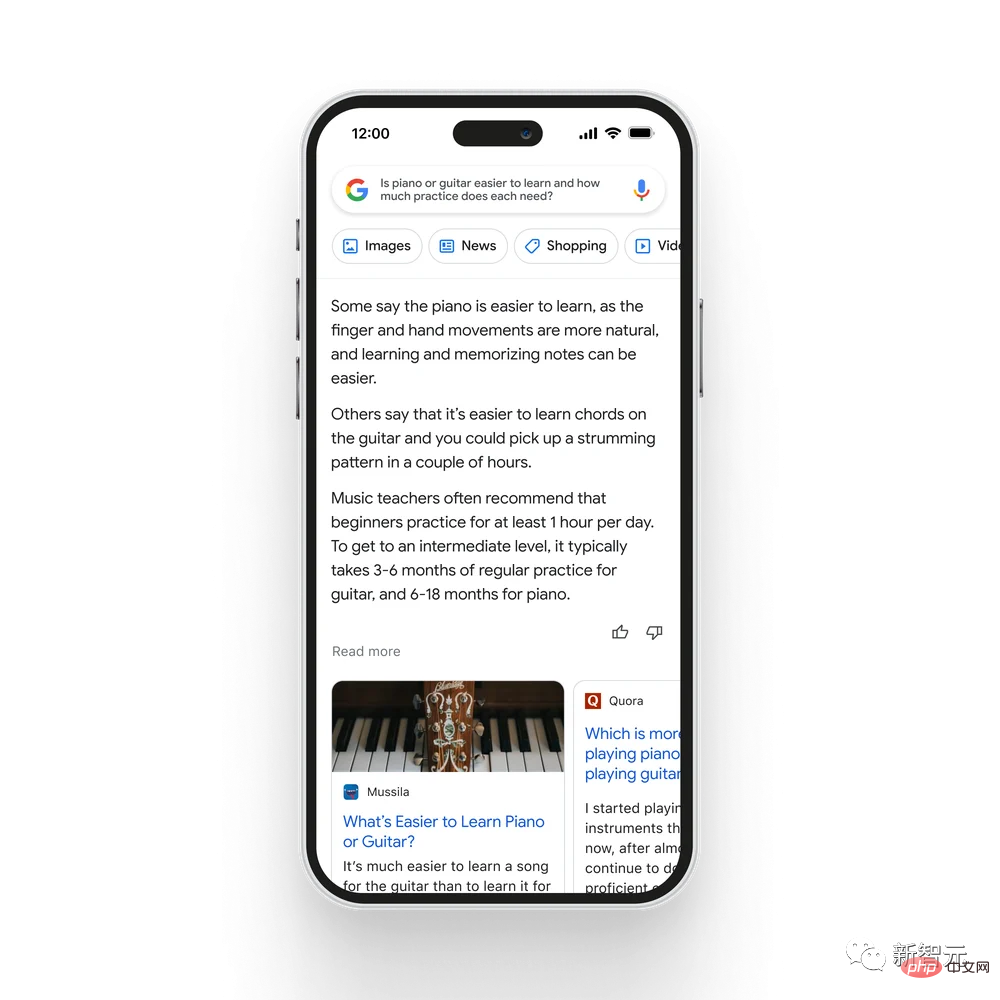
We could soon see AI-powered features in search, Google says.
In other words, Bard will distill complex information and ideas into an easily digestible form, thereby helping users understand quickly and learn more from the Internet.
Case in point: explaining a new discovery from NASA’s James Webb Space Telescope (JWST) to a 9-year-old.
Bard:
Your 9-year-old might enjoy these latest discoveries from the James Webb Space Telescope (JWST).
- In 2023, JWST discovered the galaxy nicknamed "Green Pea". The nickname comes from the fact that they are small, round, and green, like peas.
- JWST captured images of galaxies more than 13 billion years old. This means that the light from these galaxies traveled more than 13 billion years to reach us.
- JWST took the first images of a planet outside our solar system. These distant worlds are called "exoplanets." Exo means "from outside."
These discoveries can stimulate children's imagination about the infinite mysteries of the universe.
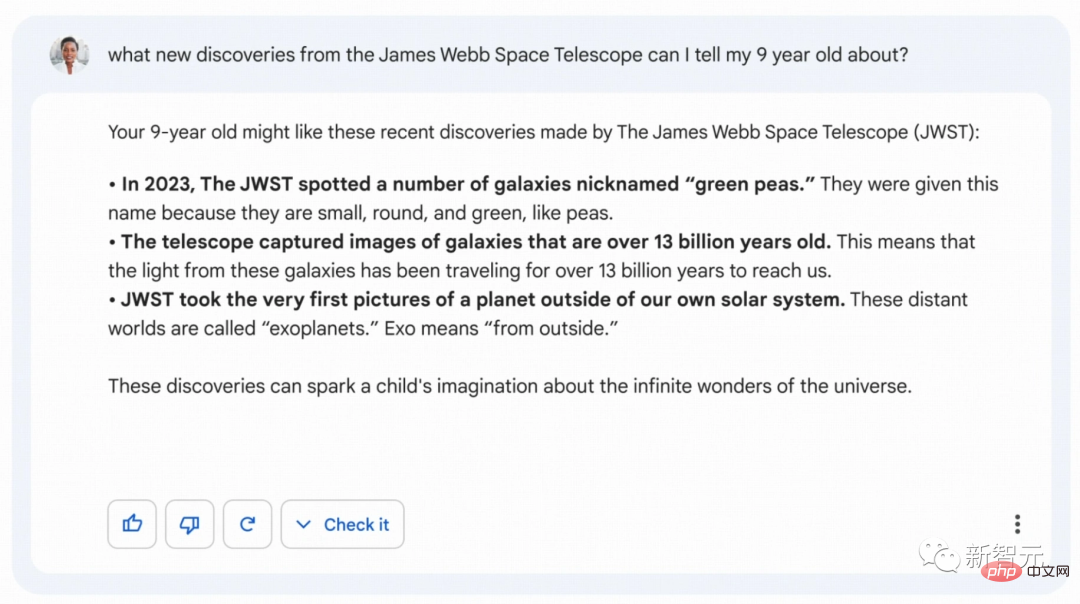
Give employees chicken blood
Except in public blogs In addition to publicity and momentum, according to CNBC, Pichai also frantically gave employees a "chicken blood boost" in internal emails.
“Next week, we’ll be asking every Googler to help shape Bard and contribute through a special company-wide “dogfood.” "
"We look forward to all your feedback in the spirit of an internal marathon, and more details will be announced soon."
This "dogfood" is actually a "slang" within Google, which means that before its own products are launched, their own people are the first to use them and experience them.
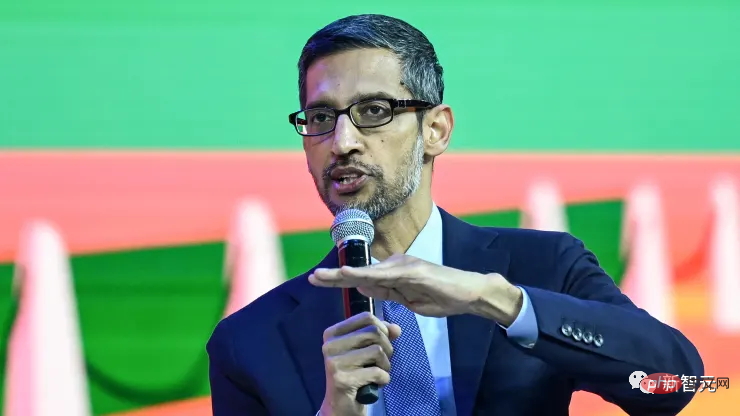
In addition, Pichai also talked about allowing external users to use the same underlying technology-LaMDA through APIs. to build your own apps and products.
"In addition to product release and iteration, we still have a lot of hard and exciting work to do. We have been treating this work with a nervous and focused attitude , which reminds me of Google when I was young. Here, thank you to everyone who has contributed."
Google: I have tolerated you for a long time
These days For months, ChatGPT stole the show.
The recent big news in the AI circle is almost all caused by ChatGPT.
It passed the Google L3 engineer interview and got an offer of US$180,000; it wrote a speech for the President of Israel; it was used by students to write the first in the class The paper made the American education community exclaim that this AI should be banned immediately; and his participation in writing scientific research papers angered Nature and Science, who issued a civil order banning ChatGPT from becoming an author.
Seeing that ChatGPT is so popular, everyone has questions in their minds: What is Google doing?
Google has always touted itself as the leader in the AI industry.
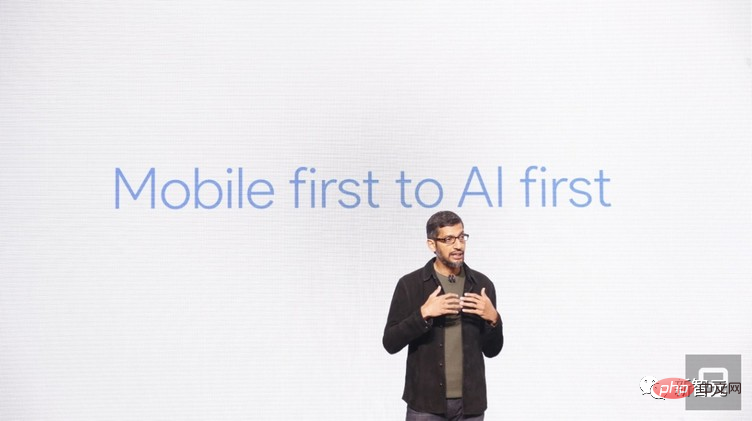
In 2016, Pichai pledged to make Google an “AI first” company
As Pichai wrote in his blog: "Six years ago, we reoriented the company around artificial intelligence. Since then, we have been Make comprehensive investments in artificial intelligence."
As early as 2014, Google acquired DeepMind. OpenAI was co-founded by Sam Altman and Musk in 2015.
What’s even more frustrating is that the Transformer that ChatGPT is based on was first proposed by Google. After several years of covert research on large language models, as soon as OpenAI’s ChatGPT was released, it took away all the limelight. Google was really going to vomit blood.
LeCun, one of the three giants of deep learning and the chief AI scientist of Meta, once commented a few days ago that ChatGPT "is not innovative", and this statement is true.

Transformer is a Google invention. Twenty years ago, the attention mechanism proposed by another deep learning giant Yoshua Bengio was used by Google in Transformer and became a key element in all language models.
In addition, the human feedback reinforcement learning (RLHF) technology used by ChatGPT was also pioneered by Google DeepMind Lab.
The reason why Google got up early and rushed to a late meeting was because it was too cautious in its strategic layout.
Success is also "reputational risk", failure is also "reputational risk"
The so-called "reputational risk" refers to the training data of the AI model The collection comes from the Internet, making it easy for AI language models to create the illusion of misinformation, exhibit racial and gender biases, and repeat hateful language.
Big companies like Google and Meta, because their products affect too many users, will think twice about every move, and their strategies will naturally not be as flexible as small startups like OpenAI. .
The result of being overly cautious is that Google’s gut is filled with regret.
People will always remember that on that day in December 2022, it was OpenAI’s ChatGPT that wrote an important chapter in the history of large-scale language models, allowing people all over the world to Chatting with bots crowds the servers, not Google.
In fact, before OpenAI launched ChatGPT, Google already had large-scale language models optimized for dialogue, such as LaMDA and Flamingo.
And Google launched the 2.6 billion parameter end-to-end neural network dialogue model Meena as early as 2020. It is said that the effect is more reasonable and specific than all other SOTA chatbots at the time .
However, Google has not yet applied these results to any products. At that time, they insisted that "reputational risk" was something that large manufacturers could not bear.
In early December, when ChatGPT first became popular, there were “whistleblowers” who felt the crisis.
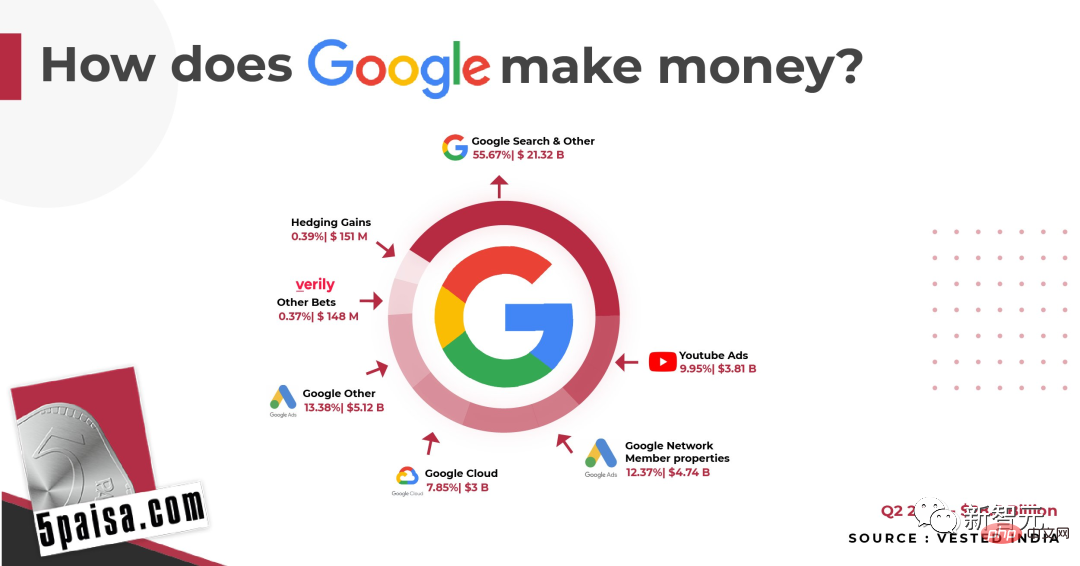
Most of Google’s revenue comes from online advertising
Sridhar Ramaswamy, the former head of Google’s advertising team, said that if ChatGPT continues to be so popular, netizens will no longer click on Google links with ads (in 2021, the advertising business earned Google $208 billion, accounting for Alphabet’s total 81% of revenue.)
However, Google executives at the time still talked about "reputational risk."
But just ten days later, their attitude suddenly changed. A "Code Red" was issued urgently to instruct multiple teams to address the threats posed by ChatGPT.
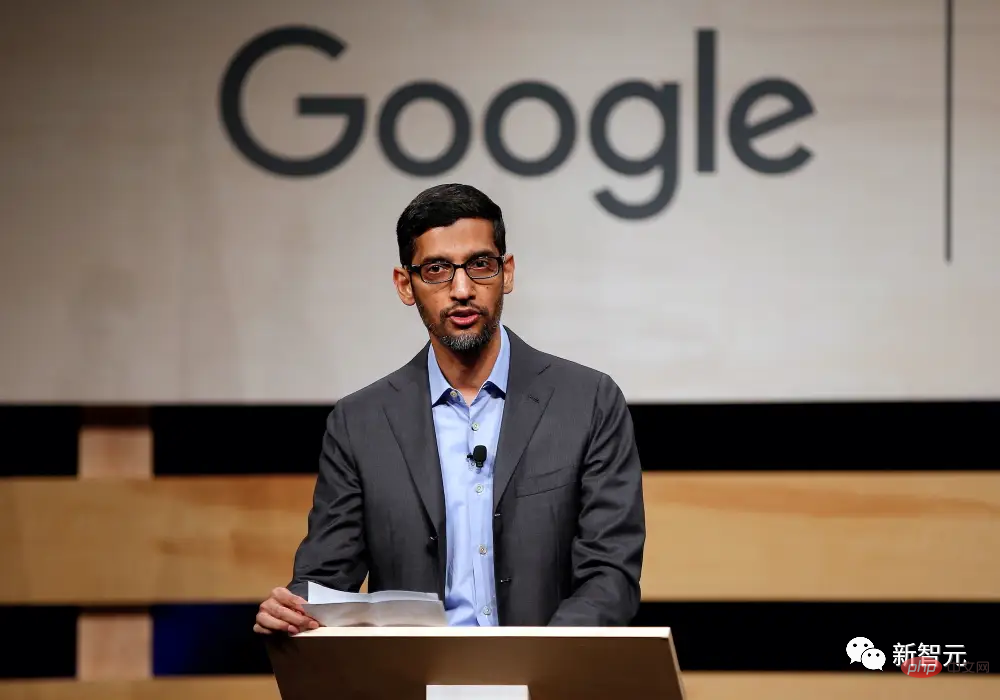
##On December 24, according to the New York Times report, Pichai told the Google team to change direction. "ALL IN"AI
#This also proves that Google has fallen into the "innovator's dilemma."
This term refers to the difficulty it has for established companies to adopt new technologies or business models that disrupt traditional markets. However, when smaller, more nimble competitors enter and take over the market, it may ultimately lead to the demise of large, established companies.
Now, ChatGPT has finally forced Google out of the "innovator's dilemma."
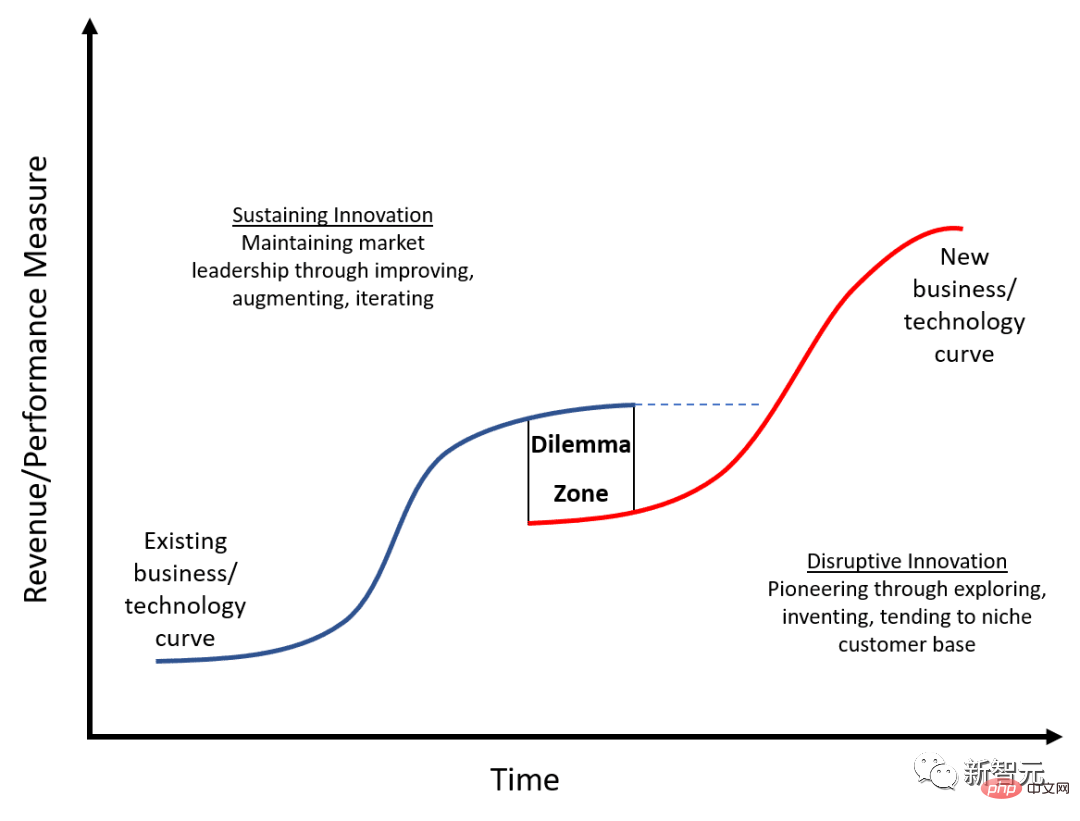
By Google's own admission, the company has chosen to err on the side of caution when it comes to adding the technology behind LaMDA to its products.
In fact, there are also disagreements within Google about this. In 2020, Google’s artificial intelligence ethics experts advocated the cautious use of text generation technology in a research draft, and some executives were angered. , the end result was that two well-known artificial intelligence ethics experts, Timnit Gebru and Margaret Mitchell, were fired.
And the researchers behind LaMD are also frustrated by Google’s hesitation. Seeing that the technology in their hands was delayed for several years and could not be put into the market, many of them left the company and established start-up companies using the same technology.
All this forces Google to stop looking forward and backward and speed up the product schedule.
ChatGPT is the last fire.
Can’t bear it anymore, no need to bear it anymore
Obviously, Google has no intention of giving up its status as the “big brother” in the search engine industry to others.

According to statistics, Google has more than 90% of the market share, while Bing only has a paltry 3%
#Since we are forced to do this, we should completely abandon the "cautious" approach of big manufacturers. Today, it launched Bard to officially compete with ChatGPT.
However, it is worth pondering that Pichai did not announce the integration of Bard into the search engine.
In the example he showed, underlying AI technology is used to enhance traditional search. For questions that do not have a unified answer, Google will synthesize a reply that reflects different opinions.
Pichai also said that Google plans to provide the underlying technology to developers through APIs, just like OpenAI does with ChatGPT, but Pichai did not provide a specific timetable.
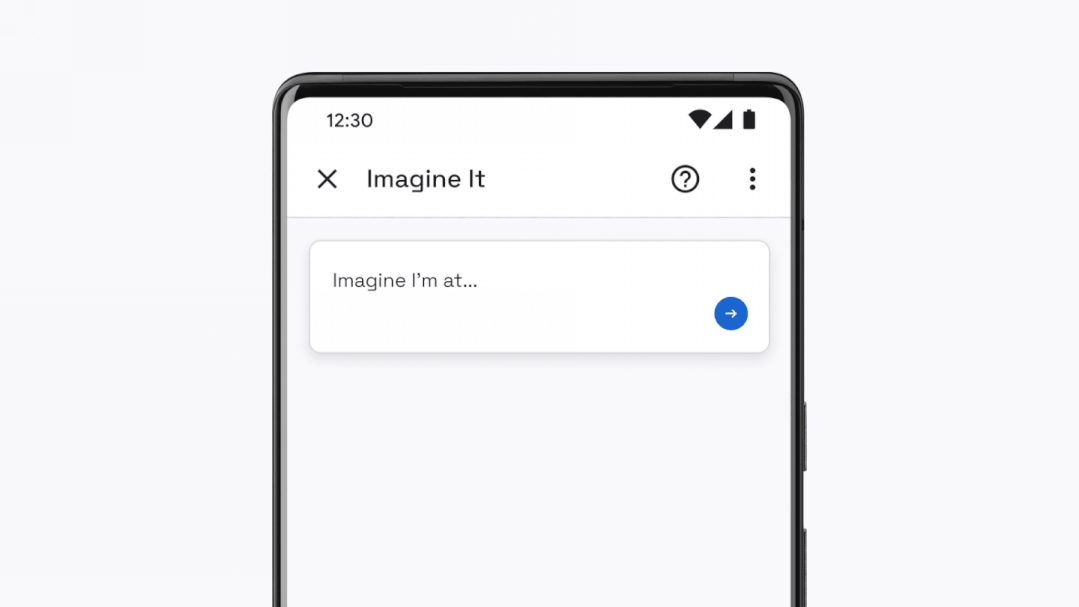
#Microsoft and Apple can’t sit still!
Microsoft was caught off guard
Google was forced to take action, and Microsoft was certainly not to be outdone.
After Pichai officially announced its chat robot "Bard", Microsoft immediately "leaked" the news that it would hold a "big release" the next day - powered by OpenAI technology Bing.
Not long after, OpenAI CEO Sam Altman posted a photo on Twitter with Microsoft CEO Satya Nadella.
It can be said that this event is “explicitly stated” to be related to OpenAI.
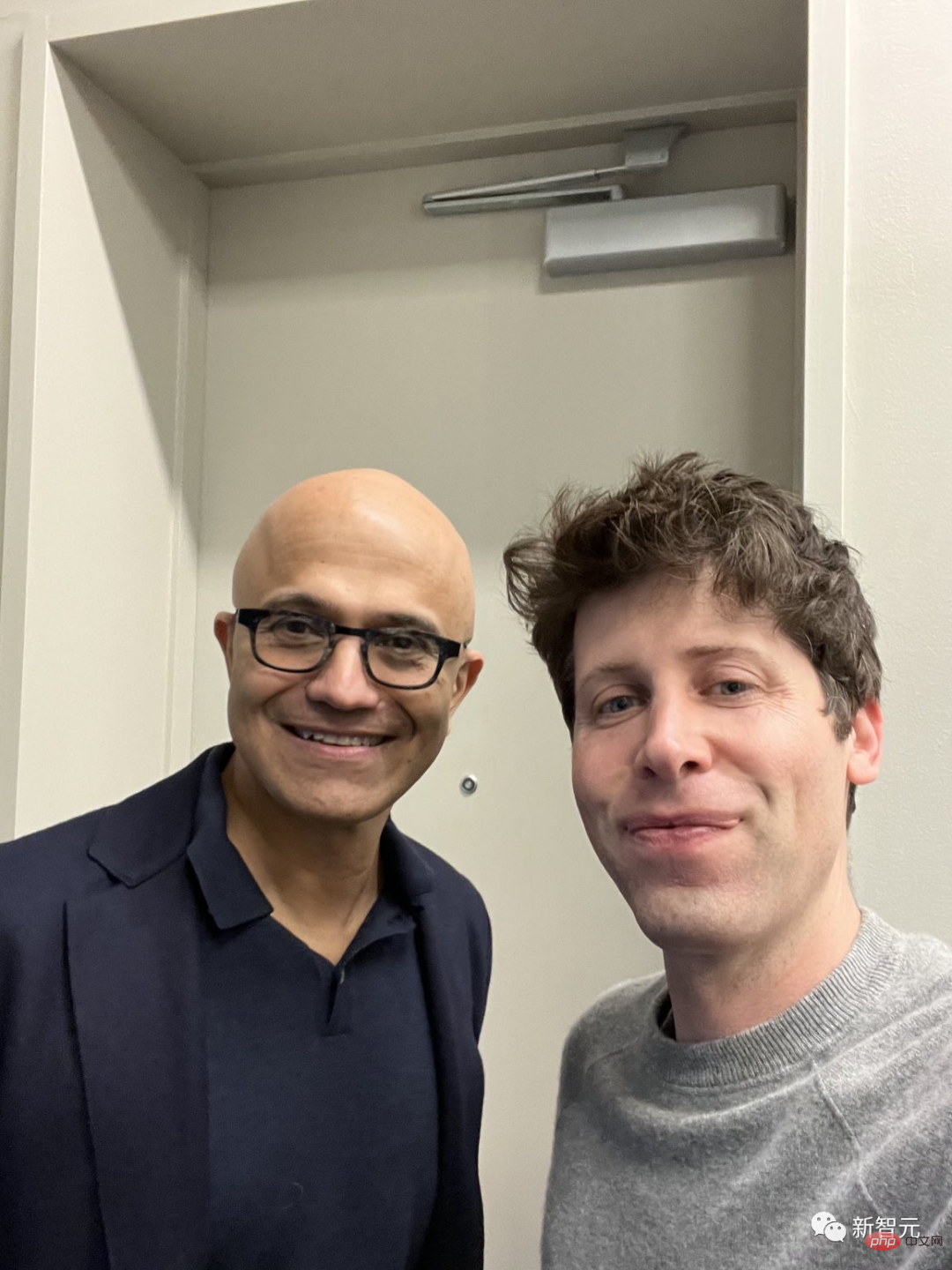
According to an invitation sent out last week, Microsoft held the event to "share some Exciting project progress."
The public opinion offensive in which Google CEO personally announced the competing product "Bard" obviously caught Microsoft off guard.
The "restrictions" that had previously required participants to maintain confidentiality were immediately lifted due to Google's overwhelming publicity.
Microsoft insiders say the company plans to use an updated version of GPT (allegedly GPT-4) to provide users with answers to searches, as previously reported - "ChatGPT integration Enter Bing and declare war on Google! Microsoft joins hands with OpenAI to detonate search engine revolution."
Just last Saturday, Bing integrated with ChatGTP briefly appeared. Although it mysteriously went offline after only a few minutes, some netizens have already had a taste of it.
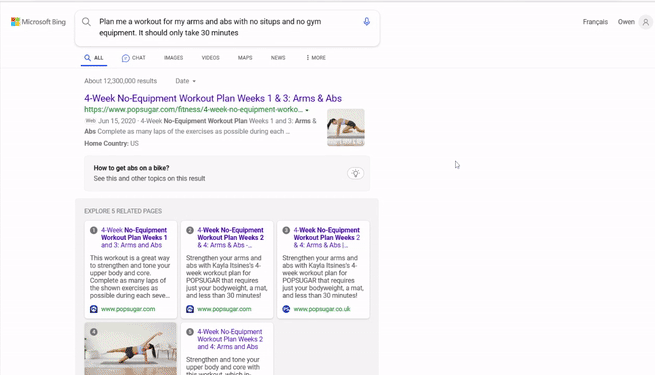
Prior to this, Microsoft had already won a beautiful victory with ChatGPT and gained the upper hand. Not long ago, Microsoft announced that it would invest another $10 billion in ChatGPT!
It has been previously reported that ChatGPT will be integrated into Microsoft’s Bing, Office Family Bucket, Azure Cloud Platform, Teams Software and other news are all sensational.
Apple rushes to keep up
Microsoft and Google are fighting fiercely, and Apple on the side seems to be unable to sit still.
According to Mark Gurman, a well-known reporter from Bloomberg, after the release of a series of AI products from OpenAI, Google, and Microsoft, Apple will hold its (original) annual internal artificial intelligence program at its headquarters next week. Smart Summit. It is similar to the AI version of the WWDC conference, but is limited to Apple internal employees.
In addition, this offline event will be held at the Steve Jobs Theater and will also be broadcast to employees through streaming media. It can be said that it is basically a restart of the way media events were held before the epidemic.
We have to suspect that Apple will also adopt this approach in future public product launches.
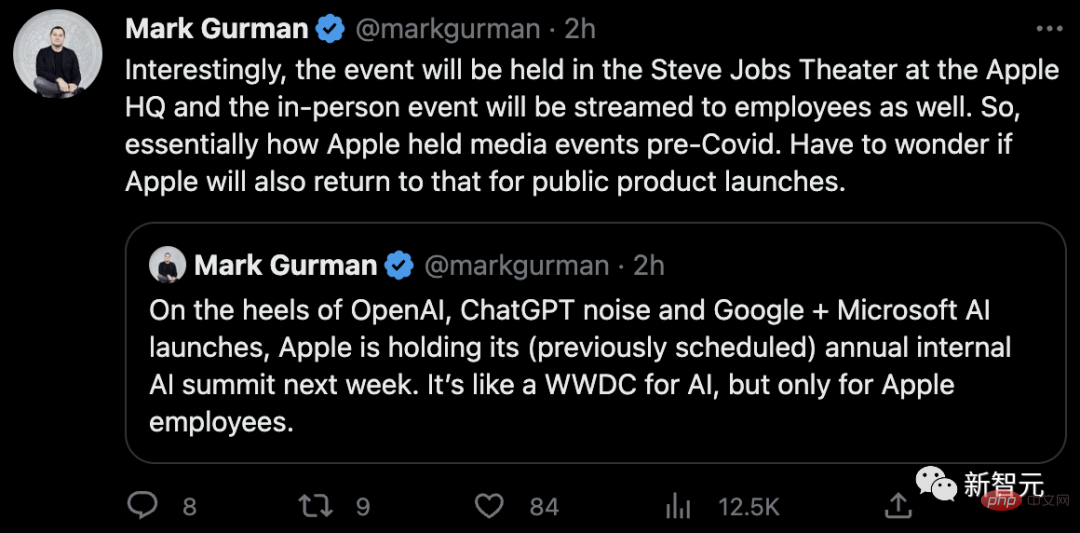
The big companies in Silicon Valley are taking the lead, but Meta seems to be standing still and making no move.
Zuckerberg spent 36 billion US dollars before, but still failed to develop the Metaverse, but he stated in December: Meta will continue to develop the Metaverse in the next year .
ChatGPT has been in full swing recently, but Meta has not seen any movement at all. The latest news is that Meta’s Reality Labs lost $13.7 billion in VR and AR last year.
No wonder LeCun is so anxious to jump on Twitter every day.
Big manufacturers are being forced into panic, and there have been predictions for a long time
Previously, foreign media published an article saying that ChatGPT has pushed all the big manufacturers into a corner.
The cornerstone of the development of artificial intelligence is laid by large companies such as Google, Meta and Microsoft.
However, now, enterprising small companies are pushing AI to the public at a dizzying speed, catching these giants off guard.
A few days ago, the Wall Street Journal conducted anonymous interviews with six current and former employees of Google and Meta. After ChatGPT received a surge of attention, it also gave technology like Meta and Google The giants have created pressure to become less concerned about security.
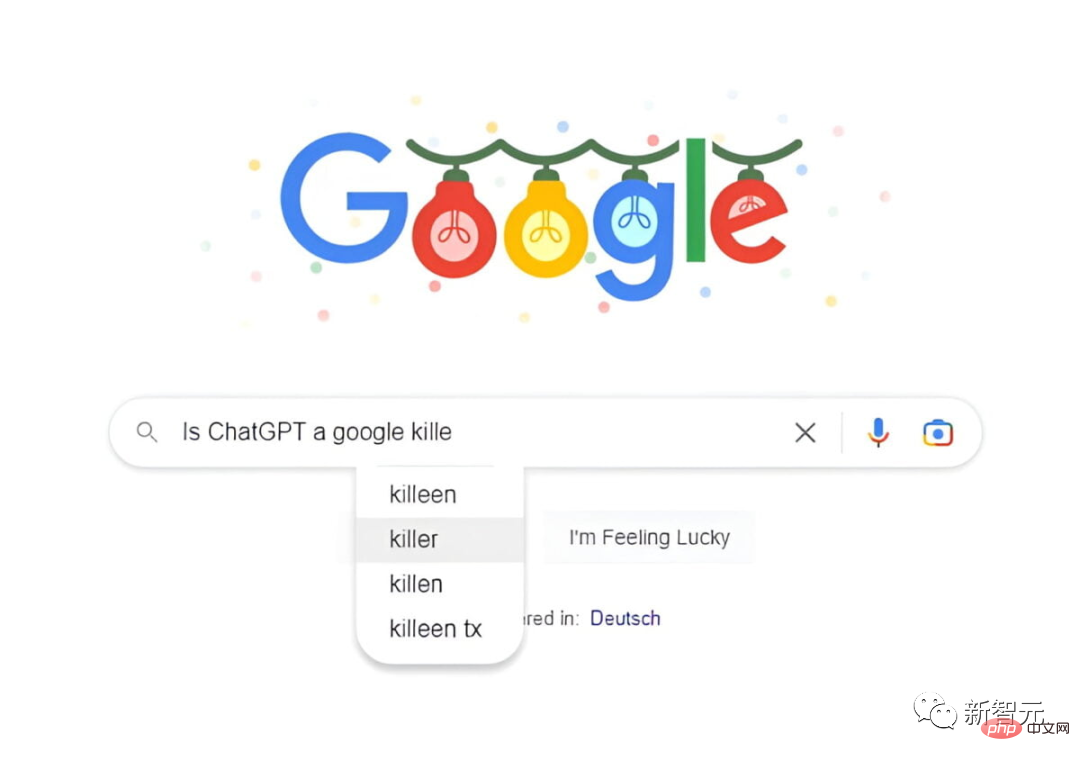
Previously, Microsoft’s Tay and Meta’s Galatica were quickly removed from the shelves due to toxic or inaccurate content.
However, in 2022, we witnessed the birth of the first year of AIGC. Especially after OpenAI released ChatGPT, there were a lot of voices saying that generative artificial intelligence could kill Google.
What is tragic is that engineers from large manufacturers have to face the frustration that the new technology they have worked so hard to research has never been able to be released as a product.
For this reason, many big names have jumped to more flexible startups like OpenAI and Stable Diffusion, while others have simply started their own businesses, such as Character.AI, Cohere, Adept , Inflection.AI and Inworld AI, among others.
And as big companies like Google and Meta begin to rush to catch up with OpenAI, those critics and ethicists will become more and more ignored.
Going from providing a series of answers that link directly to the source material to using chatbots to give a single, authoritative answer will be the next step, says a former Google AI researcher. A huge shift that has many inside Google nervous.
"Now they may think this is a threat to their core business, so maybe they should take a risk."
After all After the release of ChatGPT, perhaps Google realized that the way it made money from these models had changed—it could be a consumer product rather than just powering search or online advertising.
The above is the detailed content of Crazy opening! Google CEO personally announced that Bard will officially compete with ChatGPT. For more information, please follow other related articles on the PHP Chinese website!
Related articles
See more- Technology trends to watch in 2023
- How Artificial Intelligence is Bringing New Everyday Work to Data Center Teams
- Can artificial intelligence or automation solve the problem of low energy efficiency in buildings?
- OpenAI co-founder interviewed by Huang Renxun: GPT-4's reasoning capabilities have not yet reached expectations
- Microsoft's Bing surpasses Google in search traffic thanks to OpenAI technology

